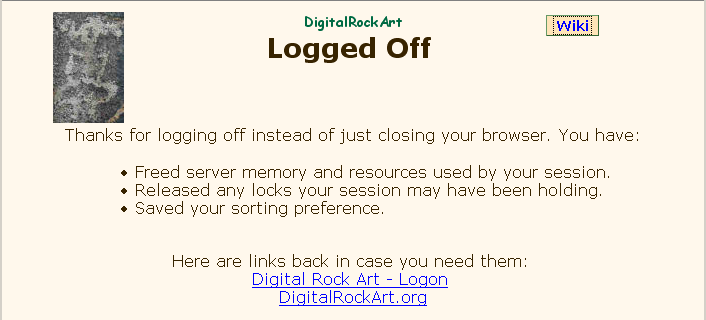|
Size: 1967
Comment:
|
← Revision 6 as of 2008-02-11 20:50:12 ⇥
Size: 823
Comment: converted to 1.6 markup
|
| Deletions are marked like this. | Additions are marked like this. |
| Line 2: | Line 2: |
| The Digital``Rock``Art application passes several cookies to your browser. A cookie contains a small amount of data that the browser sends to a particular web site host with each page request. Its purpose is to identify the incoming transaction as a continuance of several previous transactions. For example, once you have successfully logged on, the incoming cookie presented with each page request is checked to verify you have permission to access the requested page. | |
| Line 4: | Line 3: |
| All but one of the cookies are ''session'' cookies that are deleted when you close your browser. The persistent cookie contains a timestamp that is associated with your logon ID -- on return visits, your name is automatically placed into the logon form for you. | The Logoff function saves some of your session data to disk and frees server memory associated with your session. Closing your browser window or moving to a different web site without logging off consumes a small amount of server memory until the inactive session timeout is reached after one hour. |
| Line 6: | Line 5: |
| The effect of the session cookies is to keep you logged on to the Digital``Rock``Art and wiki applications until you close your browser or turn off your PC. For most browsers, you must close all running copies of the browser for the session cookies to be deleted. | However, as long as your browser remains open it will retain a session cookie with data that matches the session data written to disk. If you return to the Digital``Rock``Art web site, you will be logged on automatically. This presents a security issue if you access Digital``Rock``Art from a public server -- closing all running copies of the browser will delete the session cookie and prevent the next user of the public computer from misuse of your ID. |
| Line 8: | Line 7: |
| If you are using a PC in a public place, such as a library, internet cafe or hotel, it is very important to logoff and/or close all copies of the browser before leaving the PC for the next user. It is also desirable to delete all cookies to prevent the next user of the PC from seeing a logon form with your ID automatically entered. To do so, just click the link ''deleting all Digital``Rock``Art cookies'' and close all copies of the browser. Note that failing to perform the delete all cookies function is a very minor security issue. Assuming you have logged off and closed the browser, the next user would have to access the Digital``Rock``Art web site to see your ID. No password information is retained so a mischeivious next user would have to guess your password to successfully logon. In addition, the cookie is obsolete as soon as you logon to Digital``Rock``Art using a different computer. attachment:ScreenShots/Logoff.jpg |
{{attachment:ScreenShots/Logoff.png}} |
Logoff
The Logoff function saves some of your session data to disk and frees server memory associated with your session. Closing your browser window or moving to a different web site without logging off consumes a small amount of server memory until the inactive session timeout is reached after one hour.
However, as long as your browser remains open it will retain a session cookie with data that matches the session data written to disk. If you return to the DigitalRockArt web site, you will be logged on automatically. This presents a security issue if you access DigitalRockArt from a public server -- closing all running copies of the browser will delete the session cookie and prevent the next user of the public computer from misuse of your ID.

 DigitalRockArt Wiki
DigitalRockArt Wiki